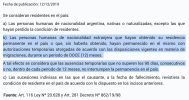gringoexpress
Registered
- Joined
- Jan 24, 2023
- Messages
- 207
- Likes
- 288
I was actually in damn near the exact same situation. After getting my St.Kitts passport, I was a bit reluctant to renounce US citizenship in case I actually had to go live in St. Kitts (the place ain't very big.) I ended up getting citizenship somewhere else entirely a few months ago thanks to a surprise change in their citizenship by descent legislation, but before that happened I was living in Argentina and on track to get Argentinian citizenship. I'm back in Argentina now because I don't want to actually live in the other country, but I would suggest that you may want to realize this gain after renouncing US citizenship but before actually getting Argentinian citizenship, because Argentina will tax you too if you have citizenship and are living here. They do not, however, tax tourists or people living here who do not have residence or citizenship as I understand.Hi Bajo,
I have been following your posts regarding similar comments of yours regarding legal residence not being required for citizenship. I’ve also read through your entire website and while I can certainly see there is a legal way of navigating citizenship this route by retaining a lawyer such as yourself, I find myself in a situation where I want to stack the odds in my favor of the fastest/most guaranteed path to citizenship.
That said, I will still be needing to retain a lawyer as my Spanish is not good and I have some specific situations with my scenario. I have ample liquid funds however no true passive income. I have been reading a strategy would be to create an irrevocable trust and funding it with 30k USD to more than cover the passive income requirement. That said, others have mentioned migraciones want to ideally see passive income from property or other non liquid investment.
Bottom line is I have an intention to renounce my US citizenship after acquiring Argentinian citizenship and St. Kitts citizenship. Time is of the essence for me as I have a unique situation with a company selling in the next few years which I do not want to be a US citizen for obvious reasons when that investment matures and distributions are made to me.
Please correct me if I am wrong…. My thoughts to stack the likliehood of swiftest and most probable chance of citizenship being granted in the fastest time with the information I provided, going for a rentista residency would be a prudent course of action. If my application is denied for whatever reason, does this severely or ultimately destroy my chances of obtaining citizenship?
Once again, I would like to retain a lawyer regardless and have made contact with your office but my hope is you stumble across this message and provide any input at all that could help steer me in the best direction with the goal of successfully acquiring citizenship without uncertainties.
The ideal time to realize your gain would be after getting the Kitts passport and renouncing US citizenship, but before actually getting Argentinian citizenship. You can be living in Argentina and in the process of *applying for* citizenship, which, as I understand, gives you the right to not get denied entry at the border and also means you can't be deported. Talk to bajo_cero about this. Once your Argentina citizenship comes through you become a tax resident, which will probably hurt more than being a US citizen. If you get permanent residency in Argentina, that also makes you a tax resident, which is what you're trying to avoid. If you realize the gain before you are an Argentina tax resident, you don't owe Argentina taxes. If you have permanent residence or citizenship, you get to pay taxes on the gain to Argentina and may end up making things worse for yourself.
If you haven't done the kitts thing yet, they either recently doubled the price or are going to very soon. The US consulate in Porto Alegre has renunciation appointments wide open if you cant get one here. Good luck.




